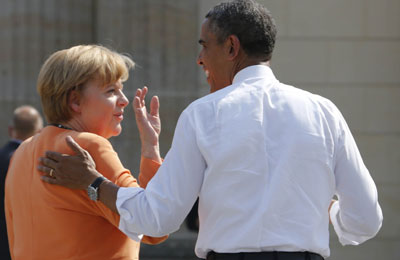
US President Barack Obama chats with Merkel at the
Brandenburg Gate in Berlin in this June 19, 2013 file photo.
Spying row - designed to disappear
New York, October 29, 2013
By Jack Shafer
If not yet the consensus opinion, by tomorrow morning almost everyone with a keyboard and a connection to the Internet who isn't also a head of state will concede that the ally-on-ally spying by the United States - revealed in documents leaked by former NSA contractor Edward Snowden to Der Spiegel - won't matter much in the long run.
This is not to say German Chancellor Angela Merkel has no right to be personally ticked off about the US snooping on her phone calls since 2002. She does. This morning, the Wall Street Journal reported that upwards of 35 world leaders were spied on by the US. They have a right to be ticked off, too, but the protests are largely contrived.
As Max Boot and David Gewirtz wrote in Commentary's blog and ZDNet, respectively, nations have traditionally spied on allies both putative and stalwart. One excellent reason to spy on an ally, Gewirtz notes, is to confirm that the ally is really an ally.
Allies sometimes become adversaries, so shifting signs must be monitored. Likewise, allies may be allies, but they always have their disagreements. What better way to prevent unpleasant surprises from an ally than by monitoring him?
Boot quotes Lord Palmerston, the 19th century British foreign minister and prime minister, on this score: "We have no eternal allies, and we have no perpetual enemies. Our interests are eternal and perpetual, and those interests it is our duty to follow."
Other reasons to spy on allies: It keeps them honest, or if not honest, it at least puts them on notice that their lies might get found out. Spying gives countries a diplomatic leg up on allies, as well as an edge in things military. The downside - well, there is really no downside unless receiving the stink eye from an ally for a couple of weeks qualifies as a downside.
And so it has been for a long time, as Slate's Fred Kaplan wrote in 2004. In 2009 Britain's Telegraph reported that spy agencies from 20 countries, including France and Germany, had sought to steal Britain's secrets. Earlier this year, the Guardian disclosed that British spooks eavesdropped on the G20 dignitaries when they convened in London in 2009, dispensing a little what-goes-around-comes-around to their allies.
Apprehended spies may suffer, as has the American Jonathan Pollard, who pleaded guilty to spying for Israel in 1987 and is serving a life sentence in prison. But the spymasters don't, so don't expect them to stop any time soon.
The longitudinal interest by the US in all things Merkel may be informed by her past. She was a citizen of East Germany before reunification, and her personal history has long been controversial. It became more so after the publication, earlier this year, of Günther Lachmann and Ralf Georg Reuth's book, The First Life of Angela M. An ardent Russophile, Merkel thrived in East Germany, which makes some question her deeper loyalties. If you were one of America's top spies, wouldn't you have opened a file on Merkel as she rose in German politics after the Berlin Wall fell? Wouldn't you have kept it updated as she became the head of state?
Just as Germany has yet to expunge its Nazi past, its eastern, totalitarian provinces have not come close to expunging their Communist past. The East Germans were brilliant at spycraft, placing the productive spook Günter Guillaume in the office of Chancellor Willy Brandt for several years. When he was arrested in 1974, the Brandt government fell. In 1993 Guillaume said: "The two men I was happiest to serve were Willy Brandt and [East German spymaster] Markus Wolf." Even if the Guillaume penetration had never happened, Western intelligence services would still have had cause to keep tabs on German politics and politicians.
It may be that Merkel's public carpet-calling of Obama is just for domestic show, as she tries to figure out what the country's next government will look like. Or maybe in a weak moment, she said something in a text message that she forgot could be monitored. Who among us hasn't? And if we haven't, it's only a matter of time before we do. But as scandals go, this seems like a Snapchat moment: it's designed to disappear.
* Jack Shafer is a Reuters columnist. The opinions expressed are his own







